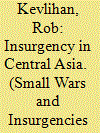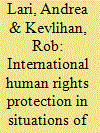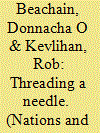| Srl | Item |
| 1 |
ID:
144774


|
|
|
|
|
| Summary/Abstract |
This article considers the experience of civil war in Tajikistan (1992–1997). This civil war represents the most significant violent episode in post-Soviet Central Asia; over a five-year period at least 50,000 people were killed and approximately one tenth of the population were displaced. This article will examine the role of local and international actors during this civil war, with a particular focus on the role that international aid and aid agencies played in governance of vulnerable populations and the impact these interventions had on conflict dynamics and the ability of insurgents to govern in areas under their control.
|
|
|
|
|
|
|
|
|
|
|
|
|
|
|
|
| 2 |
ID:
061638


|
|
|
| 3 |
ID:
136617


|
|
|
|
|
| Summary/Abstract |
The United States has made repeated public commitments to provide humanitarian aid based on need alone. However, some scholars suggest that US self-interest is a stronger predictor of US humanitarian assistance than need. We examine the tension between self-interest and need by studying the allocations made by the US Agency for International Development's Office of US Foreign Disaster Assistance for more than 100 developing countries between 1989 and 2009. Moving beyond previous studies, we measure need based on both natural (floods, earthquakes, hurricanes) and man-made (conflict related) disasters. Contrary to much previous scholarship, we find need factors shape the decision to provide aid more than US self-interest does. We also find important differences in how much humanitarian assistance is distributed in the pre- and post-9/11 eras, with foreign policy affinity to the United States and battle deaths playing useful roles in how much aid a country receives in the post-9/11 period. The findings generally point to the ongoing importance of need as a driver of humanitarian aid decisions.
|
|
|
|
|
|
|
|
|
|
|
|
|
|
|
|
| 4 |
ID:
120372


|
|
|
|
|
| Publication |
2013.
|
| Summary/Abstract |
This paper examines the state-building project in Kazakhstan since independence in 1991. It argues that both civic and ethno-nationalistic tendencies in state-building can be identified but that it is not any particular trajectory of nationalism in Kazakhstan that is of significance so much as the tensions between two very different trajectories. We argue that, at least to date, the government has succeeded in managing these tensions quite effectively both at the policy level and in its relations with different ethnic groups and neighbouring states. Whether Kazakhstan can continue to manage these tensions in the post-Nazarbayev era is one of the most significant questions facing the country.
|
|
|
|
|
|
|
|
|
|
|
|
|
|
|
|